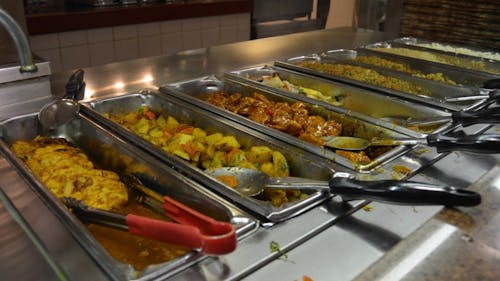Students weigh in on campus food waste at Rutgers

In 2016, Rutgers—New Brunswick produced almost four million pounds of food scraps from all of the campus dining areas combined, said Dorothy Lee, a School of Environmental and Biological Sciences senior and president of RU Compost.
Currently, the dining halls either send their food scraps to pig farms or put the scraps through digesters that liquify the food so it can be put down the drain, she said. Joe Charette, executive director of Rutgers Dining Services, clarified this in a recent interview with Nolan Fehon, a School of Environmental and Biological Sciences first-year and member of Students for Environmental Awareness.
“According to Charette, all of the dining halls have a Somat Pulper that condenses the food into a pulp that is then taken to a local pig farmer. The effluent then goes down the drain and is beneficial because it cleans the pipes,” Fehon said.
While the digesters can digest all of the food scraps and the pigs can be fed the majority of the scraps, the University has to start looking into other ways to deal with the food waste, Lee said.
“That pig farm contract is ending soon, so it needs to find a different way to deal with its food waste. We want it to heavily invest in an industrial composting facility that takes all the food scraps and has the gases and heat from it turned into energy,” she said.
In addition to the existing nine aerobic digesters on campus, the University is looking to get an industrial aerobic digester that can be used to collect and sell methane and CO2 gas as well as produce fertilizer and replace the current deal with pig farmers, Fehon said.
The University also has other systems in place to deal with food waste, he said.
“Fry oil is actually collected separately. It goes into the Vegawatt between Busch Student Center and the dining hall and it is used to give electricity to the dining hall,” he said.
From his interview with Charette, Fehon said that every dining hall recycles and many facilities already implement composting initiatives at the student centers. Waste management companies take organic waste from student center stores, such as Starbucks and Dunkin' Donuts, to a compost facility. If plates and silverware from dining areas such as Harvest Café are contaminated with food, they also go to a compost facility.
In Fehon’s interview, Charrette said that food waste may not be as big a problem as students think.
“Go look at the back of the dining halls to watch and see how much is really taken to landfill,” he said. “Only about 1 by 2 cubic feet, or 2 to 3 meals out of every 7,000 go to a landfill.”
Students are also able to use the left-over pulp from the Somat Pulper for composting and take the material from the compost bins at Harvest Café, Fehon said.
RU Compost has collected food scraps from Harvest Café in the past to compost, which is the process of diverting food scraps from going to landfills, Lee said. Instead of letting it emit greenhouse gases, composting combines food waste with carbon rich materials that decompose over time to create a nutritious soil amendment.
“Those decomposed beautifully, but what we also want is students to take off the produce stickers before they put it in the bins. That’s just something little, but it doesn’t decompose and contributes to microplastics overtime in the soil,” Lee said.
But, Harvest Café only composts kitchen scraps, not its food scraps, she said.
“(Harvest Café) said the major reason why it wasn't composting the food scraps was because of too much volume, too much contamination and the fact that facilities weren’t giving them the proper bags to put the food scraps in,” Lee said.
While Rutgers Dining Services is looking into an industrial aerobic digester, Lee said that others are heavily advocating for an industrial composting facility.
“Not only would you be able to collect from Rutgers, but also you would be able to create a hub to collect from all of the New Brunswick community and possibly Middlesex County to create energy from this food waste,” she said.
Composting is the last step before a landfill, according to the Environmental Protection Agency (EPA). The first step is reducing food waste in general, then feeding people and animals. The next step is industrial composting, and the last is composting. While composting is not at the top of the hierarchy, it is still a way to give back to the earth.
To make a difference as students, Lee said it is important to just start somewhere.
“The first step is to reduce your food waste for sure. You don’t have to be amazing at composting or zero-waste or all these buzzwords we hear as long as you’re trying,” she said. “It’s a learning process for all of us."



